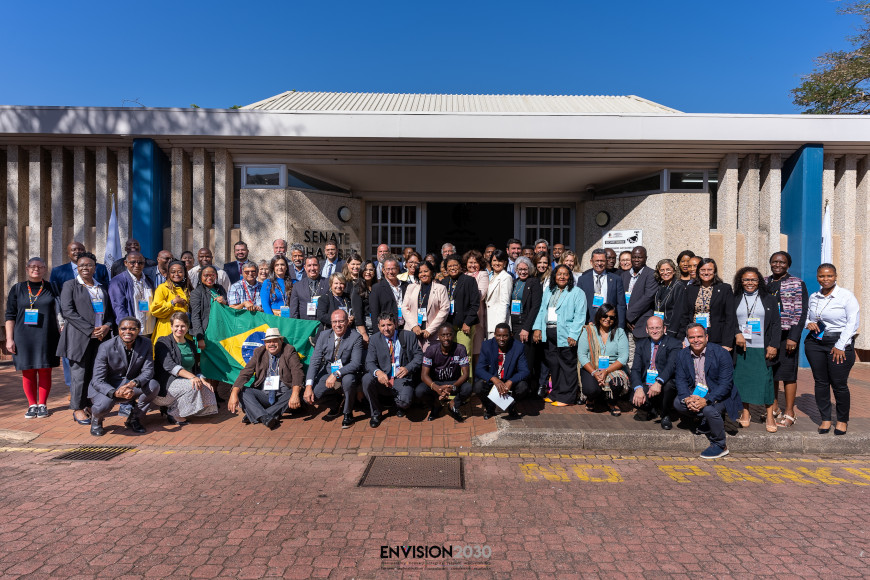The University of KwaZulu-Natal (UKZN) in collaboration with the Durban University of Technology (DUT) hosted the Brazilian Association of Rectors of State and Municipal Universities (ABRUEM) mission visit to KwaZulu-Natal institutions in South Africa. The first session was held at Senate Chamber, University of KwaZulu-Natal, Westville Campus and the second session was held at the DUT Ritson Campus, on Monday, 21 August 2023.
The mission of the delegates to South Africa was aimed to foster dialogue between the two countries and to further enhance the global partnership network for both institutions and engagement within the BRICS network.
The visit to DUT and UKZN was aimed at contributing to strengthen relations with universities in Brazil, a development in line with the South African National Policy Framework.
Welcoming the delegates from international and local universities was UKZN’s Deputy Vice-Chancellor: Research and Innovation, Professor Mosa Moshabela. He explained that the purpose of the event was to further enhance the global partnership network for both institutions and further enhance engagement within the BRICS network. He further said that ABRUEM’s mission to South Africa was to foster dialogue and exchange between Brazilian and South African education institutions.
DUT’s Deputy Vice-Chancellor: Research, Innovation and Engagement, Professor Fulufhelo Nemavhola gave insight into the rich history of the Durban University of Technology, its research focus areas, DUT global partnerships and internationalisation. He made mention of the various opportunities that collaborations can bear fruit, such as collaborative online international learning, global learning-international virtual webinars/research seminars, internationalisation of advisory boards, student and staff mobility as well as collaborative qualifications.
Adding to the conversation was Head of Department-International and Governance Relations at eThekwini Municipality, Eric Apelgren. He spoke on the promotion of higher education partnerships within BRICS.
The ABRUEM opening address was given by ABRUEM’S President, Prof Odilon Maximo de Morais, Rector UNEAL, State University of Alagoas. He gave the introduction on the Brazilian Higher Education sector and an overview of universities in Brazil.
“The Brazilian Association of Rectors of State and Municipal Universities (ABRUEM), created in 1991 and based in the country’s capital Brasilia, is one of the most important higher education organisations in Brazil and Latin America,” he said.
He proudly said that ABRUEM comprises more than 100 university veterinary and clinical hospitals that guarantee public care in the country and the development of well-worked research in the health fields. “Our association also helps to formalise partnerships with various agencies and institutions at national and international levels for affiliated universities,” he stressed.
Further on delegates were given an opportunity to attend the breakaway sessions. The first session entailed talks on innovation in internationalisation focusing on the future mobility for international collaborations was chaired by Professor Keolebogile Motaung: Director: Technology, Transfer and Innovation at DUT.
The second breakaway session had discussions pertaining to reshaping internationalisation through strategic partnerships, it was chaired by UKZN’s Professor Ernest Khalema. DUT’s Divinia Jithoo explained more on the role of Collaborative Online International Learning (COIL) in advancing internationalisation.
The delegates were then given a tour of the Aerospace, Indigenous Knowledge Systems and Documentation Centre excellent centres at UKZN. The second part of the programme saw the guests converge to the DUT Institute for Water and Wastewater Technology (IWWT) for a guided tour of the institute and experience first-hand the sterling work that is being done by the DUT team under the helm of Professor Faizal Bux, the award-winning Director of the Institute for Water and Wastewater Technology (IWWT).

Professor Walter Canales Sant’Ana, Rector of UEMA State University of Maranhao, with DUT Vice-Chancellor and Principal, Professor Thandwa Mthembu.
DUT Vice-Chancellor and Principal, Prof Thandwa Mthembu along with the IWWT Director, Prof Bux formed part of this dynamic session and tour. Delegates were thrilled to be given a preview of the IWWT plant and projects. Prof Bux gave an overview of how IWWT had started saying that water research commenced at DUT in 1994 and in 2015 the institute was funded close to R40 million by the government and the university to put up a state-of-the-art building.
DVC: RIE, Prof Nemavhola formally introduced the Vice-Chancellor and Principal, Prof Mthembu, who indicated to the delegates that their visit takes place during the BRICS summit that is being hosted by South Africa.
“BRICS is a very important forum given that both our countries are part and parcel of it. I am made to understand that the main objective of this visit is to discuss the possibilities to build or deepen existing academic collaborations. DUT has several projects that align the initiatives of BRICS. Given our strategy which we called ENVISION20230, we aim to ensure that all our projects continue towards improving the lives and livelihoods of our society. I’m mentioning those initiatives around BRICS because our strategy, we call ENVISION2030 encourages us to contribute towards improving the lives and livelihoods of our broader society. And in pursuing these goals we are working hard to apply for several BRICS grants, for example the latest grant given was granted to the Faculty of Management Sciences, and the Faculty of Applied Sciences in the field of Biotechnology. So, the choice of the IWWT is because this institute is firmly ensconced in Sustainable Development Goal 6 on water and sanitation. Once again, we really appreciate you and welcome you,” he commented.
The delegates were then led to the Ritson campus for the final presentation and a cocktail gala dinner. Speaker, Mr Ramu Damodaran, a United Nations diplomat, worked at the United Nations for more than 30 years, most recently as Chief of Partnerships and Public Engagement in the United Nations Department of Global Communications until May 2021. His talk focused on the academic impact for the Sustainable Development Goals (SDGs).
Delegates were then treated to a scrumptious cocktail dinner where more networking was done, culminating the end of a constructive programme.
Pictured: ABREUM delegates at UKZN campus.
Photographer: Khulasande Tshayile
Waheeda Peters

